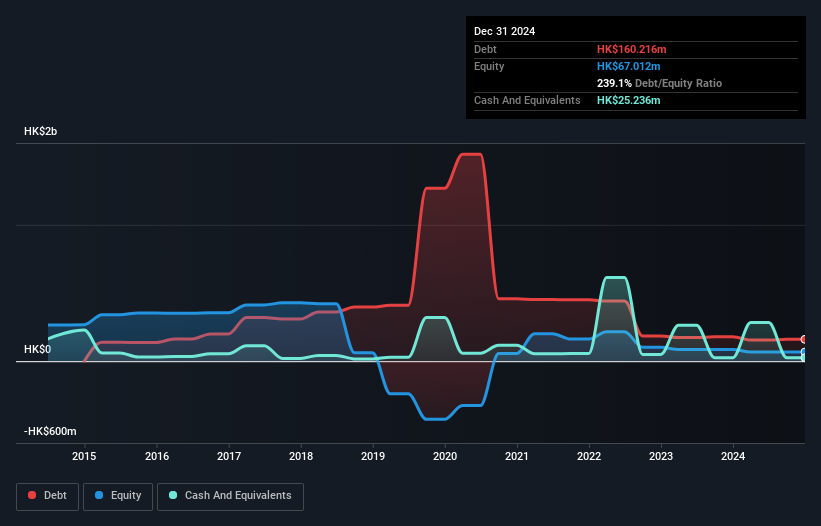
The external fund manager backed by Berkshire Hathaway's Charlie Munger, Li Lu, makes no bones about it when he says 'The biggest investment risk is not the volatility of prices, but whether you will suffer a permanent loss of capital.' When we think about how risky a company is, we always like to look at its use of debt, since debt overload can lead to ruin. We note that Jintai Energy Holdings Limited (HKG:2728) does have debt on its balance sheet. But the real question is whether this debt is making the company risky.
Our free stock report includes 2 warning signs investors should be aware of before investing in Jintai Energy Holdings. Read for free now.What Risk Does Debt Bring?
Debt is a tool to help businesses grow, but if a business is incapable of paying off its lenders, then it exists at their mercy. In the worst case scenario, a company can go bankrupt if it cannot pay its creditors. However, a more usual (but still expensive) situation is where a company must dilute shareholders at a cheap share price simply to get debt under control. Of course, plenty of companies use debt to fund growth, without any negative consequences. When we think about a company's use of debt, we first look at cash and debt together.
What Is Jintai Energy Holdings's Debt?
The image below, which you can click on for greater detail, shows that Jintai Energy Holdings had debt of HK$160.2m at the end of December 2024, a reduction from HK$179.5m over a year. However, it also had HK$25.2m in cash, and so its net debt is HK$135.0m.

How Healthy Is Jintai Energy Holdings' Balance Sheet?
Zooming in on the latest balance sheet data, we can see that Jintai Energy Holdings had liabilities of HK$255.4m due within 12 months and liabilities of HK$1.77m due beyond that. Offsetting this, it had HK$25.2m in cash and HK$81.4m in receivables that were due within 12 months. So it has liabilities totalling HK$150.6m more than its cash and near-term receivables, combined.
The deficiency here weighs heavily on the HK$93.6m company itself, as if a child were struggling under the weight of an enormous back-pack full of books, his sports gear, and a trumpet. So we'd watch its balance sheet closely, without a doubt. At the end of the day, Jintai Energy Holdings would probably need a major re-capitalization if its creditors were to demand repayment. When analysing debt levels, the balance sheet is the obvious place to start. But you can't view debt in total isolation; since Jintai Energy Holdings will need earnings to service that debt. So when considering debt, it's definitely worth looking at the earnings trend. Click here for an interactive snapshot.
View our latest analysis for Jintai Energy Holdings
In the last year Jintai Energy Holdings had a loss before interest and tax, and actually shrunk its revenue by 2.7%, to HK$1.3b. We would much prefer see growth.
Caveat Emptor
Over the last twelve months Jintai Energy Holdings produced an earnings before interest and tax (EBIT) loss. To be specific the EBIT loss came in at HK$3.5m. When we look at that alongside the significant liabilities, we're not particularly confident about the company. It would need to improve its operations quickly for us to be interested in it. It's fair to say the loss of HK$23m didn't encourage us either; we'd like to see a profit. And until that time we think this is a risky stock. When analysing debt levels, the balance sheet is the obvious place to start. However, not all investment risk resides within the balance sheet - far from it. For example Jintai Energy Holdings has 2 warning signs (and 1 which shouldn't be ignored) we think you should know about.
If you're interested in investing in businesses that can grow profits without the burden of debt, then check out this free list of growing businesses that have net cash on the balance sheet.
Have feedback on this article? Concerned about the content? Get in touch with us directly. Alternatively, email editorial-team (at) simplywallst.com.
This article by Simply Wall St is general in nature. We provide commentary based on historical data and analyst forecasts only using an unbiased methodology and our articles are not intended to be financial advice. It does not constitute a recommendation to buy or sell any stock, and does not take account of your objectives, or your financial situation. We aim to bring you long-term focused analysis driven by fundamental data. Note that our analysis may not factor in the latest price-sensitive company announcements or qualitative material. Simply Wall St has no position in any stocks mentioned.